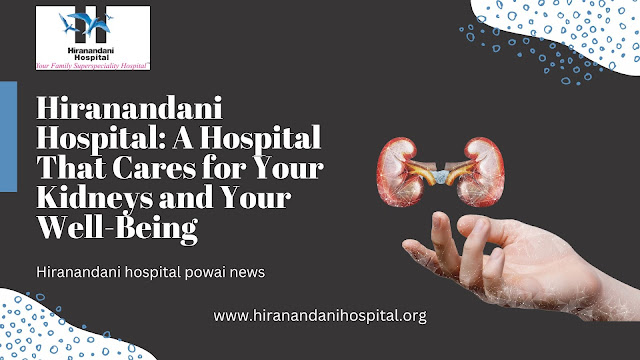Advancements in Kidney Disease Treatments
Through advances in biotechnology, medicine has seen
significant breakthroughs when tackling certain illnesses affecting people
today—including kidney diseases such as acute or chronic renal failure which
can occur due to infections, trauma, or genetic factors among other causes. For
many years medical practitioners have sought new ways of addressing this
challenge by finding improved means for diagnosing problems earlier on and more
effective methods for managing these issues longer term through sustainable
treatment strategies such as medication intake or dialysis therapy when
required but until very recently widespread access to advanced technological
solutions wasn’t available - leaving patients reliant upon lengthy hospital
stays or at home care management plans effectively cutting off avenues towards
independent longterm maintenance routines capable of providing tangible
improvements & measurable positive results outside otherwise standardized
protocols.
One of the most promising developments has come from gene
therapy which allows doctors to target and fix specific genetic mutations at a
cellular level. This approach is particularly helpful for combating Polycystic
Kidney Disease due to its ability to regulate abnormal cell growth and reduce
cyst formation.
Recent studies have also demonstrated positive effects when
using stem cells harvested from patients’ own bodies for regenerative
therapeutic options. Stem cells are special cells that can transform into any
type of cell in the body, including kidney cells. Researchers are currently
exploring the use of stem cell therapy to regenerate damaged kidney tissue,
potentially reversing the damage caused by kidney disease. Stem cell treatments
offer an approach towards replenishing lost function while bioengineered
materials provide further opportunities leading to improved filters used during
standard hemodialysis processes currently employed worldwide leading to fewer
hospital appointments needed due long term strategies targeting slow decline
mechanisms.
Also, bioartificial kidneys provide an alternative method of
artificial dialysis by recreating natural functionality within diseased organs
through synthetic tissue scaffolds that mimic native elements like capillaries
and arterioles – allowing them to facilitate more efficient waste removal
compared to other existing technologies.
Additionally, there is research being done on nanotechnology
which uses tiny nanoparticles with high concentrations of drugs specifically
targeting available biochemical pathways - thus reducing side effects while
improving drug efficacy overall.
Robotic surgery is another emerging trend offering minimally
invasive alternatives that enable surgeons to treat long-standing nephrology
problems without open operations or complicated grafts – providing both patient
comfort and quicker recovery times than traditional methods typically offer.
Also, advances in dialysis machines technology towards voice recognition
systems allow nurses & clinical care teams better control over critical
aspects such as fluid balance, pressure settings & system monitoring plus
recommendations made via higher levels of AI algorithm analytics help ensure
greater efficiency during renal replacement protocols.
Apart from these revolutionary innovations, some other
medical breakthroughs that the Doctors at Hiranandani
hospital kidney care consider worth mentioning are:
1. Precision Medicine
Precision medicine is a new approach to treating kidney disease
that focuses on individualized care. This approach uses genetic and other
patient-specific data to tailor treatments to each individual's needs. With
precision medicine, doctors can identify specific biomarkers that predict how a
patient will respond to treatment and adjust the treatment plan accordingly.
2. Immunotherapy
Immunotherapy is a new approach to treating kidney disease
that uses the patient's immune system to fight the disease. This treatment
involves using medications to stimulate the immune system to attack and destroy
the diseased cells in the kidney. Unlike traditional treatments that focus on
suppressing the immune system, immunotherapy has shown promise in improving
kidney function and reducing the need for dialysis or transplantation.
3. Artificial Kidneys
The development of artificial kidneys is a major innovation
in kidney disease treatment. These devices, unlike bioartificial kidneys, are
purely machines designed to mimic the function of a real kidney, filtering
waste products and excess fluid from the blood. This technology has the
potential to revolutionize the treatment of kidney disease, especially for
patients with end-stage renal disease who currently rely on dialysis or kidney
transplants.
4. Wearable Devices
Wearable devices are becoming increasingly popular in the
healthcare industry, and they have the potential to improve kidney disease
management. These devices can track a variety of health metrics, including
blood pressure, heart rate, and fluid intake, which can be helpful in managing
kidney disease. Patients can use these devices to monitor their health and
share data with their healthcare providers, allowing for more personalized and
effective treatment.
In conclusion, impressive progress has been made across
numerous fronts recently that could very well mean profound breakthroughs
relating not only to treating CKD/ ESRD but many forms of degenerative
illness-related afflictions. As tech continues evolving further our healthcare
capabilities depend upon those who develop these to make them not only safe but
also user-friendly so as to make patient outcomes significantly improved along
with their quality of life. With ongoing research and development, Kidney
experts at Hiranandani
hospital kidney transplant hope to see even more innovative treatments
in the near future. As always, it is essential to work closely with a
healthcare provider to determine the best course of treatment for each
individual's needs.
.png)


Comments
Post a Comment